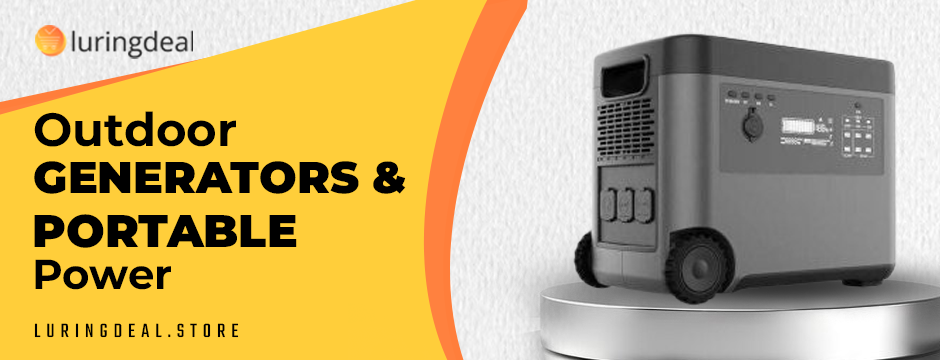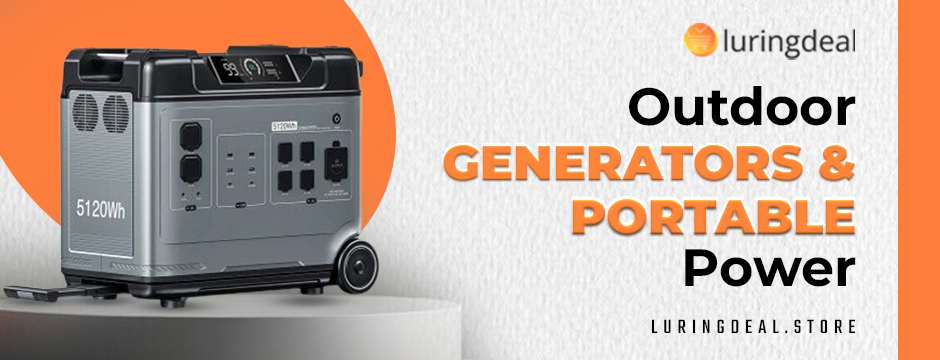Comparing Fuel Types: Gasoline, Propane, and Solar Generators

When it comes to selecting a portable home generator, choosing the right fuel type is crucial. Different fuel types offer varying advantages and disadvantages, which can significantly impact the efficiency, cost, and environmental footprint of your generator. In this blog, we will compare gasoline, propane, and solar generators, examining their pros and cons to help you make an informed decision for your Outdoor Generators & Portable Power needs. This comprehensive guide is brought to you by Luring Deal, your trusted source for Portable Home Generators.
Gasoline Generators
Pros of Gasoline Generators
High Power Output
Gasoline generators are known for their high power output, making them ideal for situations where a significant amount of electricity is needed. They are capable of running multiple appliances simultaneously, which is beneficial during power outages or for heavy-duty tasks.
Widespread Availability of Fuel
Gasoline is readily available at gas stations, making it easy to refuel your generator. This convenience is particularly useful during emergencies when quick access to fuel is essential.
Initial Cost
The initial cost of gasoline generators is typically lower compared to other types. This makes them a popular choice for those looking for an affordable solution for their portable power needs.
Cons of Gasoline Generators
Short Shelf Life of Fuel
Gasoline has a relatively short shelf life, often requiring fuel stabilizers to prevent it from going bad. This can be a hassle for those who do not use their generator frequently.
High Maintenance
Gasoline generators require regular maintenance, including oil changes and spark plug replacements. Neglecting maintenance can lead to performance issues and reduce the lifespan of the generator.
Noise Levels
Gasoline generators are generally louder than their propane and solar counterparts. This can be a significant drawback if you need a quiet environment, such as when camping or in residential areas.
Environmental Impact
Gasoline combustion produces harmful emissions, contributing to air pollution and greenhouse gases. This makes gasoline generators less environmentally friendly compared to other fuel types.
Propane Generators
Pros of Propane Generators
Clean Burning Fuel
Propane is a clean-burning fuel, producing fewer pollutants and greenhouse gases than gasoline. This makes propane generators a more environmentally friendly option.
Longer Shelf Life
Propane has a longer shelf life than gasoline, and it does not degrade over time. This makes it a more reliable fuel source for long-term storage and infrequent use.
Quieter Operation
Propane generators typically operate more quietly than gasoline generators. This is a significant advantage for residential use and outdoor activities where noise can be a concern.
Dual-Fuel Capability
Many propane generators come with dual-fuel capabilities, allowing them to run on both propane and gasoline. This flexibility can be beneficial during emergencies when one type of fuel may be more accessible than the other.

Cons of Propane Generators
Fuel Availability
While propane is widely available, it is not as readily accessible as gasoline. You may need to visit specialized suppliers or stores to refill your propane tanks.
Lower Energy Density
Propane has a lower energy density compared to gasoline, meaning it provides less power per unit of fuel. This can result in shorter runtimes and the need for more frequent refueling.
Higher Initial Cost
Propane generators generally have a higher initial cost compared to gasoline generators. This can be a deterrent for those looking for a budget-friendly option.
Storage and Handling
Propane requires proper storage and handling due to its pressurized state. This can be more complicated and potentially hazardous if not managed correctly.
Solar Generators
Pros of Solar Generators
Environmentally Friendly
Solar generators are the most environmentally friendly option, as they harness energy from the sun and produce zero emissions. This makes them an excellent choice for those looking to reduce their carbon footprint.
Low Operating Costs
Once the initial investment is made, solar generators have very low operating costs. There is no need to purchase fuel, and maintenance requirements are minimal.
Quiet Operation
Solar generators operate silently, making them ideal for use in noise-sensitive environments such as campsites and residential areas.
Unlimited Power Supply
As long as there is sunlight, solar generators can provide an unlimited power supply. This makes them a reliable option for long-term power needs, especially in remote locations.
Cons of Solar Generators
High Initial Cost
The initial cost of solar generators can be quite high, especially for models with large battery capacities and advanced features. This can be a significant investment for many users.
Weather Dependent
The efficiency of solar generators depends on the availability of sunlight. Cloudy days and nighttime can reduce their power generation capabilities, necessitating a backup power source.
Limited Power Output
Solar generators typically have lower power outputs compared to gasoline and propane generators. They may not be suitable for powering high-wattage appliances or running multiple devices simultaneously.
Large Storage Requirements
Solar generators with large battery capacities can be bulky and require significant storage space. This can be a drawback for those with limited space or who need a highly portable solution.

Conclusion
Choosing the right fuel type like for your Outdoor Generators & Portable Power depends on your specific needs and preferences. Gasoline generators offer high power output and convenience but come with higher maintenance and environmental costs. Propane generators provide a cleaner-burning alternative with a longer shelf life but may have higher initial costs and require careful storage. Solar generators stand out for their environmental benefits and low operating costs but have limitations in power output and weather dependency.
At Luring Deal, we understand the importance of selecting the right generator for your outdoor generators & portable power needs. Whether you prioritize power output, environmental impact, or ease of use, we offer a range of Portable Home Generators to suit every requirement. Explore our selection today and find the perfect generator to keep your home powered and your outdoor adventures energized.
By carefully considering the pros and cons of each fuel type, you can make an informed decision that meets your power needs while aligning with your values and lifestyle.



















Leave a comment